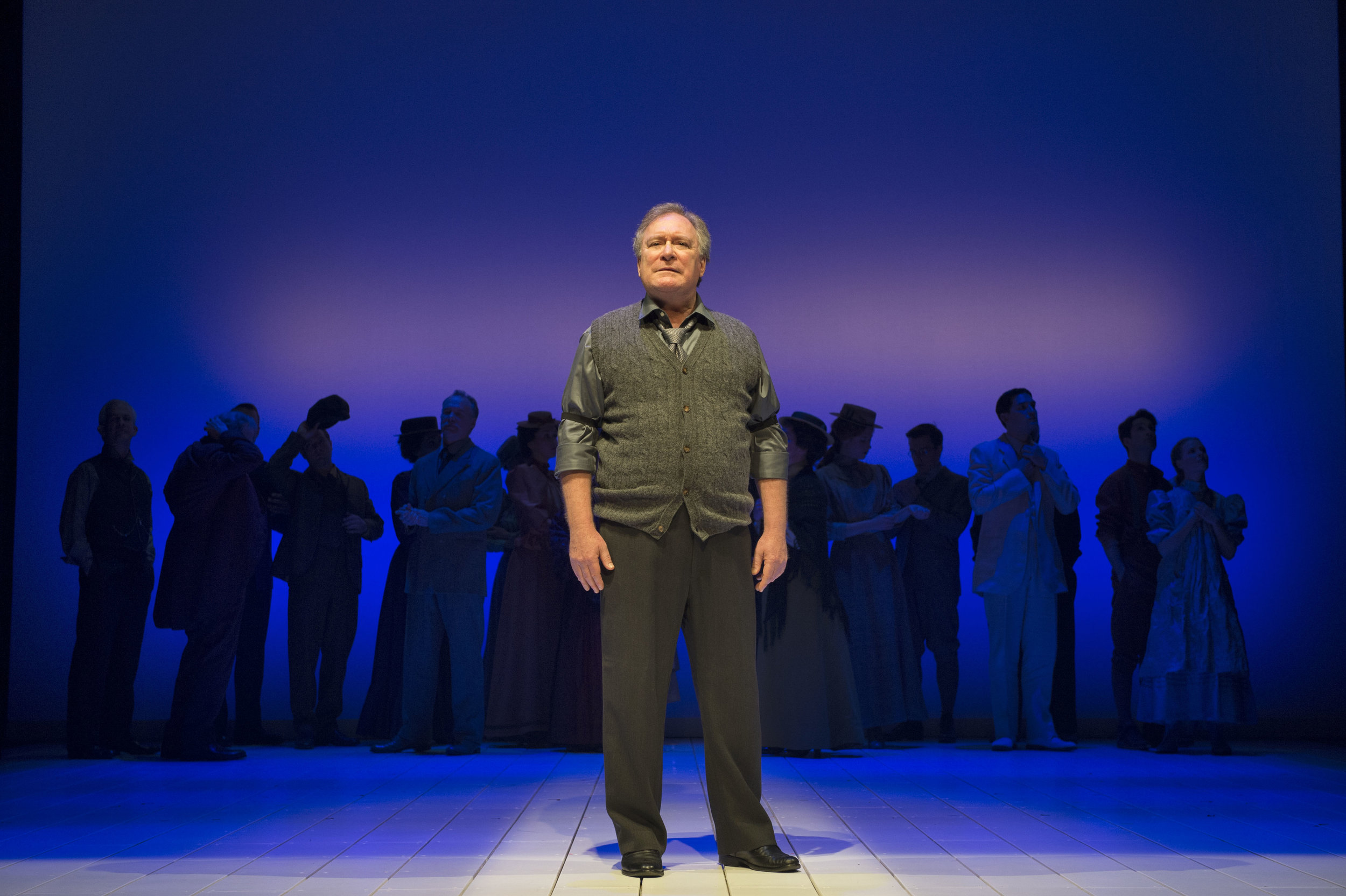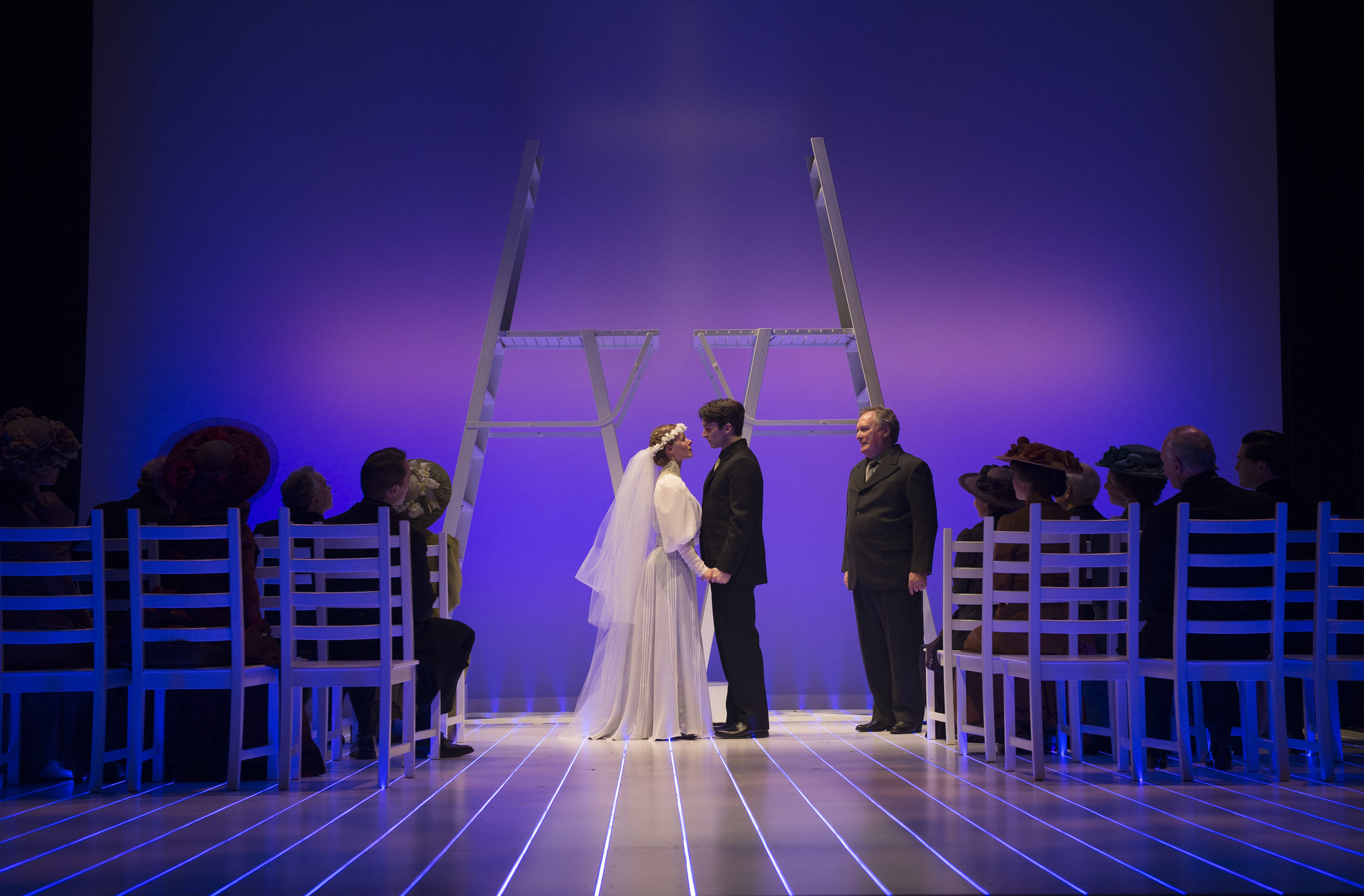Thornton Wilder’s “Quiet Masterpiece” - Interview with Molly Smith
Tappan Wilder: Wonderful to talk with you! My first question is the obvious one: What was your first encounter with Thornton Wilder?
Molly Smith: When I was 12 years old and I was in the 8th grade, I played Ma in the Happy Journey in Yakama, Washington. And I won an award as the best actor in this acting competition. In Yakama. That was my very first time with Thornton Wilder. And I have to say, I’m sure I was brilliant in the role…but a 12-year-old playing the mother?!? Hmm…
Tappan Wilder: Have you revisited the play since?
Molly Smith: I looked at the play maybe a decade ago. It’s a very good play.
Tappan Wilder: I love it, but it’s quite a dark play.
Molly Smith: Believe me, even as a kid it was dark. Which is interesting. Young people understand Thornton Wilder’s world very, very well.
Tappan Wilder: What about other encounters with Wilder? Are you familiar with his novels, for instance?
Molly Smith: I knew The Bridge of San Luis Rey and then later, as you know when I was at Arena Stage, we did a co-production of Matthew Burnett’s adaptation of Theophilus North. But before then, I started a theatre in Alaska called Perseverance Theatre and that theatre was born in 1979. And I believe that in 1983, Rita Giomi directed Our Town for us in a black and white and gray production. There was only one moment of one prop in the entire play, which was a red rose when Dr. Gibbs takes a rose to his wife’s grave. It was very strong. And my mother played Mrs. Gibbs. I just talked to her the other day about it—and you’ll get a chuckle out of this—and I said, “Mom, I remember you so clearly in this play”—she’s 94 now—and she said, “Didn’t we all die in Act 3?” And I said, “No, no Ma. But you did.”
Tappan Wilder: You know, Arthur Miller is on record, Molly—and I don’t have this quote exactly, but it’s pretty close to say he believed that Thornton didn’t have a very good grip on tragedy. I’ve always wondered why he said that because there’s so much darkness and tragedy in Wilder. But I think there’s also, of course, redemption.
Molly Smith: I actually find that a very odd reaction to Wilder’s work. Maybe he thought that it needed to be one single person with a fatal flaw who dies at the end. More of a classic definition of tragedy. But certainly Wilder was unafraid of death. It was something he obviously carried with him his entire life: he was really, really interested in what that next phase is.
One of the things that I loved about working on Our Town is the way in which Wilder was one of the first American writers to write a play about ordinary people. He was really fearless about that. And I have to say that I had reticence about directing it. When Jackie Maxwell asked me, I said, ‘Oh, I don’t know. I don’t know if I want to approach this play. Of course he’s a great writer, but I don’t know if I want to approach it.’ There’s such a veneer of sweetness and frosting on top of so many productions of it. And I went foot-dragging to it. And then as I was flying on a plane, I read the play and I cried for 2 hours. And I said, ‘Of course, I must direct this play.’ The Shaw has one of the finest companies in the world, I think. They’re just bone honest. And I knew that we would be able to really carve out the characters in such a way that we would get to the emotional truth, which is the hallmark of Thornton Wilder’s work. And that’s what they did.
Tappan Wilder: Do you think the actors came in with a strong pre-conceived notion of what Our Town was all about?
Molly Smith: I think many of them did. I think some looked at as a homespun tale. A simple story. But the further and further we investigated it, the more we went into the darkness, the depth, and the structural brilliance of the play, the more the actors moved into it until so many of them were saying, ‘This is one of my favorite experiences I’ve ever had in the theatre.’ Get out and see it at The Shaw Festival this summer if you have the opportunity.
It’s very spiritual production. I see it as a meditation on life and death and marriage and love.
The designers we were able to bring it into something quite modern as you can see from the imagery. Editor Webb says ‘we don’t care a lot about culture here per say in kind of a classic sense but we notice a lot about the natural world and we notice a lot about the birds around here’, and because of this, I asked the lighting designer, Kimberly Purtell, to look at artists like Rothko who create emotional landscapes. I wanted to allow the audience to be able to meditate on their own lives, to find an openness in the design. I didn’t want to go with a brown wooden floor or bring that kind of darkness to the world. Early on I said, ‘I just have this one image which is white wooden floor boards with spaces between them and light that we can blast up from below when we go back in time at the end of the play.’ And then Ken MacDonald said to me, ‘I think we should just go with an all white set,’ and I said, ‘Well, I think that’s a brilliant idea. Because it will allow Kim the freedom to play.’ Then with Bill Schmuck, the costume designer, I asked that each one of the costumes be in the time period, but really just silhouettes—as opposed to a lot of goo-gobs on them or gingham or things like that. I said, ‘Let’s just get to the starkness and the beauty of the lines so that the actors’ faces really stand out emotionally in the world of the play.’ So one actor is always in blue, one actor is always in purple, or one actor is only wearing brown down to a brown shirt and a brown tie. Or when the men are wearing their black suits, they’re wearing black suits with black shirts so that the story stands out in high relief. The actors did the same thing emotionally.
The music and sound effects by James Smith are so moving. First of all, over 200 sound effects on the production with so much mime—and then James wrote music with strings. And the sound he brings into the room is contemporary and classical at the same time.
And of course the play? It’s a quiet masterpiece. My time thinking on it, because of the time spent on the play in the rehearsal hall, was profound for me. …That which we most reject we are most drawn to!
Tappan Wilder: I’m so moved by what you say, Molly. For some people this is sort of the post-David Cromer age for Our Town, and I find this point of view very interesting. I’m grateful for David’s production because it restored to the record in a rather dramatic way, the harder edges of the play.
Molly Smith: Yes!
Tappan Wilder: But we’re in a different place now. I thought the white color of your set strikingly dramatic! I don’t’ think anyone’s ever done anything like that, Molly. It’s quite wonderful.
Molly Smith: I don’t know. You’d know more, Tappan. Have there been thousands and thousands of productions of Our Town since 1938?
Tappan Wilder: Oh yes, certainly. And you know, in the first 20 moths after the Broadway production closed, nearly 700 theatres did it in every state but Rhode Island as well as in all of the Canadian Provinces. Now that’s not just because of the success of the Broadway production. I think this enormous success was in part because many cities and towns out there had produced The Happy Journey, and several of his other one act plays scores of times in the 1930’s—and they wanted more Wilder! And they’d read The Bridge of San Luis Rey. It was like the 1st World War: For first part of the 30’s Thornton Wilder lobs all these artistic artillery shells over the front to sort of soften things up, and then he launches the attack with Our Town. I can’t explain it.
But can you talk a minute about the way Wilder writes women? Do you find him particularly sensitive in his treatment of women?
Molly Smith: I think his treatment of women is pretty astounding for that time period. It’s really moving. I think of Thornton Wilder as the Walt Whitman of the theatre world. They both contain these oceans within them about humanity. They just understood. They understood humanity in a deep way with out prejudice. I mean, I’m sure they had their own prejudices, but the infinite love that they had for human beings just shines through in their work, like in Leaves of Grass and Our Town. They understood. And both of them were really moved by war. I’m sure he’s been compared to Whitman before. They seem to share something together.
Tappan Wilder: J.D. McClatchy has compared him to Whitman. Sandy says something along the lines of ‘it’s the same cool, clear, loving light that both Walt Whitman and Wilder throw on the human race.’
But going back to an earlier question, you mentioned that many of the cast members approached the play assuming that it was a play about a small town?
Molly Smith: I think they saw it as a simple play and as we moved through it, they were moved by the complexity of it. These are Shaw actors. These are actors that are brilliant with GB Shaw. So they’re great with language. It was parsing every single word and really driving into the life force of the work.
At one point, Ben Campbell (who plays the Stage Manager), a fantastic actor whose father was Douglas Campbell and knew Thornton Wilder, was saying that his father used to talk about him all the time—Thornton this and Thornton that. Ben was too young to have known Wilder, but his brother remembers when Wilder would visit the Campbell household. At a certain point, we were talking about how to bring the essence of who the Shaw actors were—the life vitality of Shaw—into the play, because of course it’s being done at the Shaw Festival. What’s shared between these two writers? And Ben really found it in the 3rd Act speech when the Stage Manager says, ‘there’s something eternal about every single human being.’ And you feel that vitality just shake in the room. Because there’s an expectation in Thornton’s work that what he’s going to say is going to be about God, but he doesn’t mention the word God. He says ‘there’s something eternal about each human being.’ How fantastic. How fantastic to give us that deep understating that there’s an eternity about each person, even for those who have passed on. And that’s very Shavian too—that life vitality. So we found a way through the speech through Shaw to Wilder. And you can only do that with Shavian actors.
Tappan Wilder: How about laughter and humor, Molly?
Molly Smith: Lots of laughter in the audience. Tears at the end of the play. One group of women sitting behind us said ‘Oh my god, it’s beautiful. It’s just like life. Only in the theatre it’s more beautiful than life. But I really love that we saw it.”
Tappan Wilder: To me its’ a Golden Age for the play. For a long time professional theatres didn’t give it all that much attention, but it has suddenly exploded in the last 15 years. And your production at the Shaw Festival sounds like an extraordinary performance.
So here’s my last question: If Thornton Wilder were alive today, is there anything you’d like to ask him?
Molly Smith: I would ask him a personal question. I would say, ‘You understood marriage so deeply. Why did you never marry?’
Tappan Wilder: Well, you know this gets to the whole question of his sexuality. And I talk about this totally openly. When Penny Niven was writing the biography..
Molly Smith: Oh my god, I love the Letters and the Biography.
Tappan Wilder: Well, she knew that Sam Steward had spent one night with Thornton that didn’t go well. It’s fascinating. He was so deeply closeted. I told Penny that if she didn’t find anything other than Sam Steward—because there was inexact information that Sam Steward reported—I said, ‘we need to put something about this in the biography.’ What happens, of course, is that people read into him stuff they want to see there. He was a buoyant, wonderful man to be around.
He always said he was too busy to get married. Of course he was away from his home several hundred days a year. There’s a terrible loneliness and sadness in his stories.
Molly Smith: Yes there is. And maybe the reason he was able to write so beautifully about that part of the human experience is because he was an outsider. He had a love for intimate human relationships and was able to observe it in a way that gets more complicated to observe if you’re in the middle of it. Of course, that’s Walt Whitman too and his sexuality.
Tappan Wilder: I think I knew Thornton pretty well, Molly. I understand him today as the “eyes on the wall.” All his characters are lonely and that’s the Whitman too. He was always struck by the wonder and beauty of existence.
Bless you, my dear and thank you for this talk.
Thornton Wilder’s Our Town, directed by Molly Smith, is running now through October at the Shaw Festival.
Top photo: Benedict Campbell as Stage Manager with the cast of Our Town. Photo by David Cooper.




